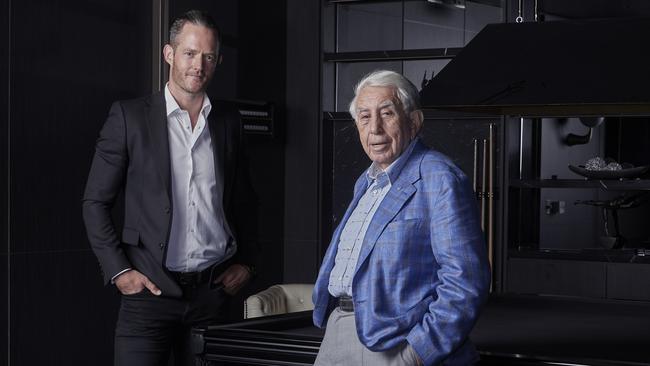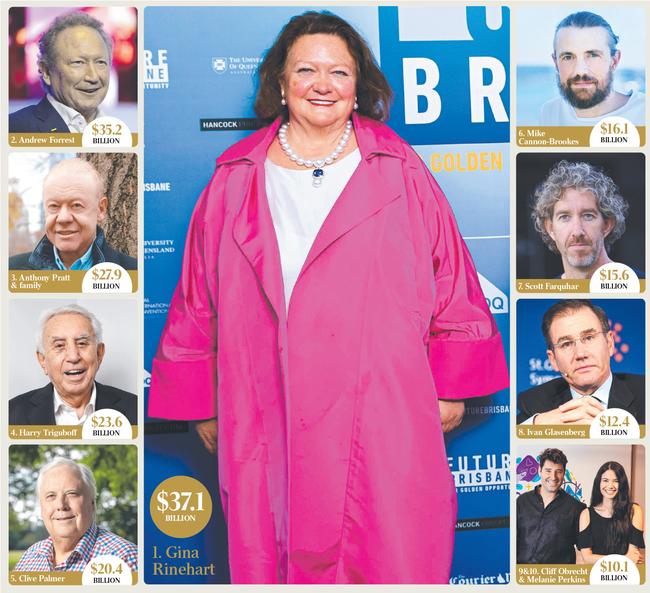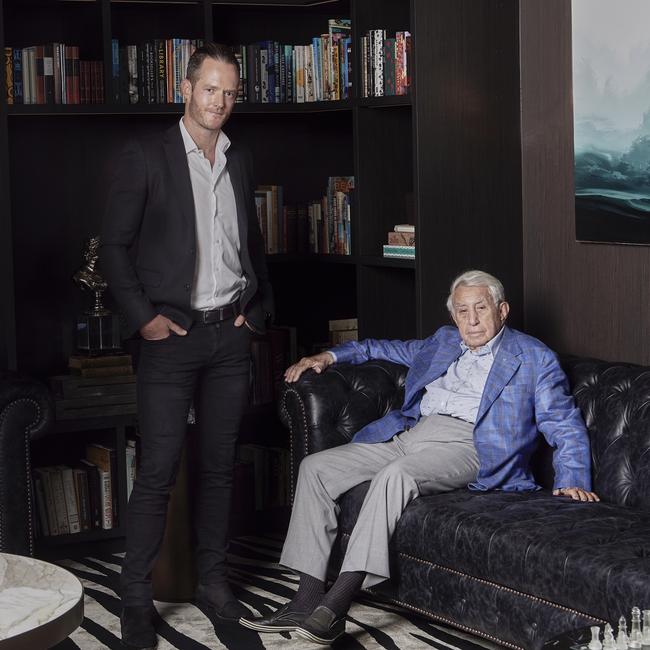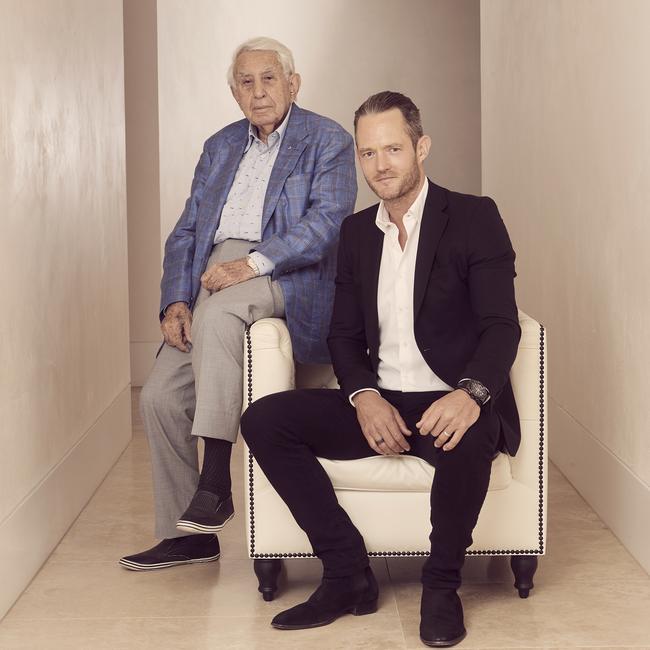Australia’s Richest 250: Harry Triguboff and Tim Gurner, the two property developers making it on this year’s list
They may be worlds apart in age and style, but Harry Triguboff and Tim Gurner agree property is the only game in town.

Billionaire Harry Triguboff has just arrived at Tim Gurner’s opulent new $550m Saint Moritz project in Melbourne’s St Kilda and is sizing up his precocious fellow property developer.
“He’s the future,” Triguboff says with a chuckle as he points to the well-groomed Gurner nearby, before adding with a theatrical tap of his own puffed-out chest: “I’m the present.”
A few weeks later, in mid-March, Triguboff is feted at Sydney’s historic Town Hall by hundreds of guests who have gathered to celebrate the 60th anniversary of his Meriton powerhouse as well as his 90th birthday.
Australia has had big names in property over the years – think Frank Lowy in shopping centres, Lang Walker building huge office and residential projects and Greg Goodman in the industrial sector – and big corporations such as Lend Lease, Stockland and Mirvac. But there’s no one quite like Harry. As he enters his seventh decade in property, Triguboff shows no signs or intention of slowing down and gives short shrift to any talk of retirement.
Don’t miss your copy of The List: Australia’s Richest 250, exclusively in The Australian on Friday, March 24 and online at rich250.com.au.
His Meriton is a colossus. It employs more than 900 people building up to 2000 apartments annually, managing 19 serviced apartment locations with about 5200 suites, as well as the 4500 units Triguboff owns himself, with almost 2000 more in the pipeline.
“If you don’t enjoy it, you should get out of it,” Triguboff says with a dismissive wave when asked if he ever thinks of stepping down.
“Don’t worry about money. This [career] is to be enjoyed. That is why I do it.
“My main partners have always been governments [who set planning policy] and the banks, who provide the funding. Now, I think my third partners are doctors. They keep me going, but they also keep the population going too with people living longer. That is good for our sector!”

Meanwhile, Gurner is celebrating his 10th year in business with his eponymous property brand, which has $10 billion worth of apartments under construction or under way, made more than a dozen acquisitions of sites dotted around Australia last year, and has just launched a high-end $150 million health, wellness and anti-ageing brand called Saint Haven.
“I love it,” he says. “If I could design buildings and sell them day in and day out, that’s what I’d do.
“The 10 years has been an amazing period of growth to get where we are. But this is just the basis of a platform to take advantage of where the market is going now. We’ve got a lot that we want to do.”
Gurner represents a new breed of property developer. Where Triguboff is mass market, Gurner is up-market. He meticulously cultivates his brand, and the adjacencies he goes into are lavish bars and new-age health pursuits.
Ever the pragmatist, Triguboff prefers supermarkets and childcare centres in his apartment blocks. He has cornered the market in making money in property, with his empire worth a cool $23.8 billion this year – making him the fourth wealthiest person in Australia.
–
Could someone else work with such dogged persistence ever again? Could Gurner be a Triguboff in the making?
–
Gurner can’t hide his admiration for Triguboff and the fact that someone 50 years his senior is still setting the pace in the residential sector.
“How could you keep up with Harry?” he asks with a smile. “It would be pretty hard. Just look at him.”
Triguboff might be one of a kind, but the question is can someone else work with such dedication and dogged determination and persistence in a tough industry for more than six decades ever again? Could Gurner be a Triguboff in the making?
There’s a long way to go for the 40-year old, but it won’t be for lack of trying. Gurner has closely studied Triguboff’s unique management style and nimble approach to running a big business, with a tight-knit and loyal group of executives, a meticulous approach to number-crunching, and an intimate understanding of market conditions and buyer habits and preferences.
What has he learnt?
“We’re doing pretty much everything Harry does apart from [our own] lending and construction,” Gurner points out. Those two factors, for now at least, mark crucial differences between the pair, but there they probably share more similarities than even they would admit.
Gurner has moved into the ranks of The List quickly in a sector in which it traditionally takes time to literally build wealth. Bricks and mortar is a longer game than the rollercoaster ride that the tech sector – the main source of young billionaires these days – can be, for example.
While Triguboff is defying time, 40-year-old Gurner is trying to make it up quickly. With his well-cut suits, impeccable grooming and a meticulous dedication to his own health regimen, he looks the archetypal modern business person in a hurry. Gurner’s estimated wealth is $677 million, which places him at number 192 on this year’s Rich 250.
Triguboff is talking to Gurner in Saint Moritz’s plush basement level, which features a library and secret bar space for residents, a concierge service, a stunning 25m heated pool and amenities such as a gym and yoga space as well as cryotherapy and massage rooms.
It is a world away from more functional Meriton apartment blocks that dominate Sydney, where Triguboff sells to a market that prefers restaurants, supermarkets and childcare centres on the ground floor of his buildings.
“We operate in different markets,” he says, looking around at St Moritz after sizing up Gurner. “He does things differently to me.”

Triguboff has mostly done things his way over his six decades in business, building his empire. He fought the unions, survived the credit crunch of the mid-1970s, keeps battling councils and governments regarding planning laws, was a pioneer of selling apartments to Chinese migrants, pivoted to keeping his own apartments as investment properties and now owns more hotel rooms in Australia than anyone else.
“They [his employees] call it a family company. They made this company, not me,” he says. “That’s how we did it. Because we are in it together all the time. That’s why we succeed. We are very close to each other, and I’ve always built everything myself and we’re not someone who depends on outside finance.”
Gurner obviously doesn’t have six decades of experience or the access to profits that Triguboff has built up over that time, or the workforce of builders and loyal subcontractors that Meriton has – some of whom have been with Triguboff’s company for three generations.
Instead, Gurner has joined with real estate financier Qualitas to secure a $2 billion capital injection from an offshore institutional event to fund the growth of his build-to-rent division in Sydney.
That came after Gurner and Qualitas had secured $1.2 billion for their build-to-rent development fund in October 2021, and used it to fund the platform’s first 1700 apartments in Sydney and Melbourne.
“He needs a big turnover … because he has to share his profits,” Triguboff points out about Gurner’s strategy. “You have to be very careful, because all this is very costly. You have to trust your partners.”
Gurner says he works hard at the relationships he has with his financiers, and that he worries more about the sharp rise in construction costs than finding funding.
“We’re very fortunate to have a large pipeline … and we’ve got 10-11 apartment projects fully permitted and ready to go when market conditions are there for us. But construction costs have still jumped 20 per cent in two years and revenues haven’t done the same, so it is not easy to make [projects] stack up.”
Triguboff then notes that Meriton now effectively carries no debt and is big enough to even have its own vendor financing division that lends to its apartment buyers who may not necessarily be able to get loans from mainstream banks.
–
TURNING POINT
Gurner has closely studied Triguboff’s unique management style and nimble approach to running a big business
–
“I’ve got the spare cash, because I haven’t been able to get as many approvals [to build new projects] as I would like,” Triguboff says. “So I can afford to help people. The problem with the banks is they interfere with people and say you can’t afford this, so I won’t give you enough money [to buy an apartment].
“But I’ve been lending money to buyers for 20 or 30 years, so I have some idea. Who am I to tell anybody what they can and can’t afford, how they should spend or not spend? If a person wants a house, they can adjust. I know my properties. I only lend for them, of course. Have I had any defaults? Maybe one or two, here or there. That is all.”
Triguboff is described as “the best control freak in Australia” by another prominent billionaire on The List. It is meant to be a compliment about the way Triguboff always knows what is happening in every part of his business empire. He is considered the ultimate hands-on boss.
Being mostly based in Sydney helps with another famous Triguboff habit. He visits a Meriton site every day, saying he has to see the building sites with his own eyes to understand how they are progressing, and then how they will sell.
He then charges from meeting to meeting in the company’s CBD headquarters each afternoon, checking on sales prices, room occupancy rates and other pressing matters.
Gurner shakes his head at Triguboff’s habits, but then points out some traits of his own.
“I’m on site every week,” he says.
“I probably focus more on sales. I spend a lot of time in our display suites, so when Harry is walking the construction sites, I’m working the sales suites. I still love getting to sites – you can’t feel a site and if it is going bad if you don’t walk it. But it is the same with sales. Without selling then you’re not getting anything off the ground. I draw up every floorplan and no one can sell it better than me.”
Gurner makes a point of trying to engage with every one of his big buyers. He says he would meet with them and signed at least 80 per cent of the contracts exchanged at Saint Moritz, and he spends most of his time at the moment on the Gold Coast – where he is building a $1.7 billion project at Budds Beach that includes a St. Regis hotel.
“If you’re spending more than $5 million on an apartment then you’ve definitely met me,” says Gurner. “When you’re selling $600 million or $1 billion in a project you have to be present.
“I am extremely passionate about the creative vision for my projects. Because I do the creative side, I want to and need to know what the buyers like and don’t like about it, because for the next project you have to get that right as well.”

Both Gurner and Triguboff are also optimistic about the outlook for the property market. While Triguboff pioneered the strategy of building apartments and then keeping them to rent out – at a time almost 20 years ago when sales had dried up – Gurner has jumped into the build-to-rent market with both feet.
He says residential property will likely “boom”, thanks to a combination of a lack of supply coming onto the market and pent-up demand from buyers and renters arriving in Australia from overseas.
“You’ve got a situation where there’s no supply and immigrants are coming back, international students and the Chinese are returning, and so we’re going to have an almighty rental crisis.
“At some point in the next six months to 18 months you’re going to have an almighty boom. The government is going to have to do something to loosen up lending. So [the market] should stabilise and then take off.”
Meanwhile, Triguboff is railing against the Reserve Bank of Australia’s use of rising interest rates to fight stubbornly high inflation and the effect it has on the housing sector.
“You can’t beat inflation by raising rates,” he says. “It is rubbish. It affects housing the most, which is definitely depressed because no one is building. So they build less but demand grows, and then prices will go up. It is only a matter of time.
“They talk about 2 to 3 per cent [annual inflation target]. That’s nonsense. I’m not a trained economist but if it is at that rate then we are not doing well enough [in the economy]. In my opinion, it would be better focusing on 4 per cent.”
Triguboff says he spends a lot of his time dealing with council planning matters – “It is my biggest focus; it is too much time” – and Gurner also says that he struggles to get his head around the intricacies of council planning in Sydney.
Both agree that Queensland is a better state to build in, and Triguboff predicts NSW will start losing population to its northern state if approval rates don’t quicken.
Triguboff also remembers getting an offer from the Chinese firm Country Garden to buy Meriton in 2014 – well before the Chinese property downturn of the past year.
Gurner says: “We’ve had approaches [from potential buyers] in the past two years. But that is premature right now. We own 100 per cent of the business and we want to make it bigger and better. When you own 100 per cent I can make decisions any time and move quickly in the market.”
In that way, Gurner is similar to Triguboff in wanting to just keep going in property. There’s nothing else he’d rather be doing.
“Obviously it’s a passion, right? It’s not really work or life, it’s just that the whole thing is one. It’s not that there’s no work/life balance, [but] I think if you’re doing what we’re doing you have to love it.
“Actually, you have to enjoy it. Otherwise, you couldn’t do it.”
The 2023 edition of The List – Australia’s Richest 250 is published on Friday in The Australian and online at richest250.com.au





